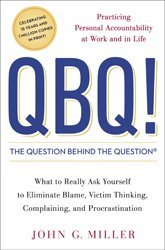Many organizations struggle with finger-pointing and blame when things go wrong, often leading to frustration, tension, and stalled progress. However, embracing accountability allows teams to focus on solutions instead. In today’s episode of The Small Business Show, we’re diving into how to create a culture of personal accountability with John G. Miller, best-selling author of QBQ! The Question Behind the Question: Practicing Personal Accountability in Work and in Life and founder of QBQ, Inc.
QBQ! The Question Behind the Question: Practicing Personal Accountability in Work and in Life

Creating a culture of accountability begins with asking introspective, solution-oriented questions rather than placing the blame on others. Miller’s technique, called “the question behind the question,” or QBQ, is a concept in which individuals intentionally shift their perspective by discarding questions prompted by complaints. Instead, they should ask themselves action-oriented questions.
For example, instead of asking, “When will my coworker do their job correctly?” Instead, ask, “How can I support my coworkers in achieving our goal?”
The difference between the two questions is that the first directs blame. The latter is solution-oriented and promotes action.
Miller shares three critical components of effective QBQs:
- Start questions with action-prompting words such as “what” or “how.”
- Incorporate “I” to shift the focus and take personal responsibility.
- Take that question and form it into actionable steps.
For example, “What can I do to support my teammates better?” or “What can I do better today?”
Incorporating QBQ into the workplace can help leaders foster an environment where workers hold themselve to a higher level of accountability, are more open to feedback, and feel respected and supported. Additionally, these teams often demonstrate higher levels of productivity, reduced interdepartmental tensions, and a more positive and action-oriented culture.
While the actionable items are, in theory, simple, they can be challenging. Accepting blame can often be uncomfortable, and shifting it to someone else is easier.
However, consistently practicing QBQ can help individuals reclaim their sense of agency over themselves, build confidence, and create more self-motivated and adaptable mindsets. It also helps organizations build a healthy, happy workplace culture.
While it may feel unnatural initially, the benefits are well worth the effort.
“Once people stop trying to change others and focus on themselves, everything gets better.” – John Miller






